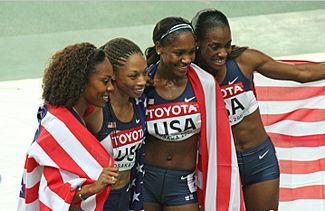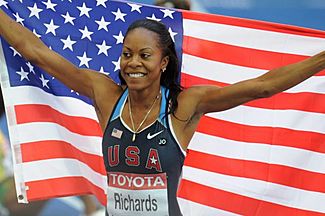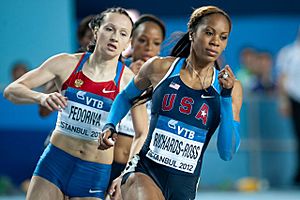Sanya Richards-Ross facts for kids
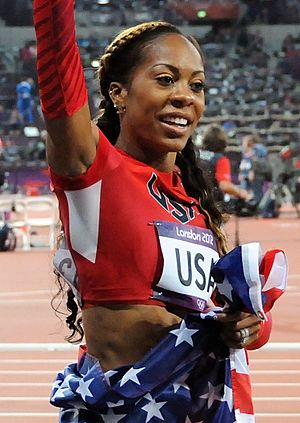
Richards-Ross at the 2012 Summer Olympics
|
||||||||||||||||||||||||||||||||||||||||||||||||||||||||||||||||||||||||||||||||||||||||||||||
| Personal information | ||||||||||||||||||||||||||||||||||||||||||||||||||||||||||||||||||||||||||||||||||||||||||||||
|---|---|---|---|---|---|---|---|---|---|---|---|---|---|---|---|---|---|---|---|---|---|---|---|---|---|---|---|---|---|---|---|---|---|---|---|---|---|---|---|---|---|---|---|---|---|---|---|---|---|---|---|---|---|---|---|---|---|---|---|---|---|---|---|---|---|---|---|---|---|---|---|---|---|---|---|---|---|---|---|---|---|---|---|---|---|---|---|---|---|---|---|---|---|---|
| Born | February 26, 1985 Kingston, Jamaica |
|||||||||||||||||||||||||||||||||||||||||||||||||||||||||||||||||||||||||||||||||||||||||||||
| Height | 5 ft 8 in (1.73 m) | |||||||||||||||||||||||||||||||||||||||||||||||||||||||||||||||||||||||||||||||||||||||||||||
| Weight | 137 lb (62 kg) | |||||||||||||||||||||||||||||||||||||||||||||||||||||||||||||||||||||||||||||||||||||||||||||
| Sport | ||||||||||||||||||||||||||||||||||||||||||||||||||||||||||||||||||||||||||||||||||||||||||||||
| Country | ||||||||||||||||||||||||||||||||||||||||||||||||||||||||||||||||||||||||||||||||||||||||||||||
| Sport | Track and field | |||||||||||||||||||||||||||||||||||||||||||||||||||||||||||||||||||||||||||||||||||||||||||||
| Event(s) | 400 m | |||||||||||||||||||||||||||||||||||||||||||||||||||||||||||||||||||||||||||||||||||||||||||||
| Achievements and titles | ||||||||||||||||||||||||||||||||||||||||||||||||||||||||||||||||||||||||||||||||||||||||||||||
| Personal best(s) |
|
|||||||||||||||||||||||||||||||||||||||||||||||||||||||||||||||||||||||||||||||||||||||||||||
|
Medal record
|
||||||||||||||||||||||||||||||||||||||||||||||||||||||||||||||||||||||||||||||||||||||||||||||
Sanya Richards-Ross is a retired American track and field athlete. She was a star in the 400-meter sprint. She won an Olympic gold medal in the 400-meter race at the 2012 Summer Olympics. She also became the world champion in 2009.
Richards-Ross was one of the best 400-meter runners in the world for many years. She was ranked number one in the world from 2005 to 2009, and again in 2012. In 2006, she set the American record for the 400-meter race with a time of 48.70 seconds. She has run the 400-meter race in under 50 seconds more times than any other female athlete in history.
Besides her individual medals, she was a key part of the U.S. women's 4 × 400 meters relay team. She helped the team win three Olympic gold medals in a row in 2004, 2008, and 2012. She also won five relay medals at the World Athletics Championships.
After an injury in 2016, Richards-Ross retired from running. She now works as a track and field analyst for NBC. In 2017, she wrote a book about her life called Chasing Grace: What the Quarter Mile has Taught Me about God and Life. Since 2021, she has appeared on the TV show The Real Housewives of Atlanta.
Contents
Early Life and School
Sanya Richards-Ross was born in Kingston, Jamaica, on February 26, 1985. She started running when she was seven years old. At age 12, her family moved to Fort Lauderdale, Florida. This move gave her a better chance to get a scholarship to an American university.
In high school, she was a track superstar. She won nine Florida state championships in events like the 100-meter, 200-meter, and 400-meter sprints. In 2002, she was named the National High School Girls Track and Field Athlete of the Year. She graduated with a perfect 4.0 GPA.
From 2002 to 2005, she attended the University of Texas, Austin. She studied business and was a star on the track team.
Career as a Professional Athlete
First Olympic Games
In 2003, while still in college, Richards-Ross won the U.S. national championship in the 400-meter race. This win allowed her to compete at the 2003 World Championships. While she didn't win an individual medal, she helped the U.S. 4x400 meter relay team win a gold medal.
In 2004, she made her first Olympic team. At the 2004 Summer Olympics in Athens, she finished sixth in the 400-meter final. A few days later, she won her first Olympic gold medal with the U.S. 4x400 meter relay team. After the Olympics, she became a professional athlete sponsored by Nike.
At the 2005 World Championships, she won a silver medal in the 400-meter race. She was passed near the end of the race by Tonique Williams-Darling of the Bahamas. Richards-Ross later said she learned a lot from this loss about race strategy.
Setting Records and Facing Challenges
In 2006, Richards-Ross had an amazing season. Her goal was to break the American record in the 400-meter race. She did it, running a time of 48.70 seconds. This made her the new American record holder and the seventh-fastest woman ever in that event at the time. She was undefeated for the whole season.
The 2008 season was more difficult. At the 2008 Beijing Olympics, she was expected to win the 400-meter gold medal. She had a strong lead but tired at the end and finished with a bronze medal. In her book, she later explained that she was going through a very difficult personal time before the race, which affected her performance.
Even though she was disappointed, she still showed her strength. In the 4x400 meter relay, she ran the final leg. She made up a large gap to catch the Russian runner just before the finish line, winning another gold medal for the U.S. team.
Becoming a World Champion
In 2009, Richards-Ross was determined to bounce back. She began working with a sports psychologist to help with her anxiety. Her hard work paid off. At the 2009 World Championships in Berlin, she finally won her first individual global title. She dominated the 400-meter final, winning in 49.00 seconds.
She also anchored the U.S. 4x400 meter relay team to another gold medal. Her 2009 season was nearly perfect, and she was named the IAAF World Athlete of the Year.
The next two years were tough because of injuries. She had to end her 2010 season early. In 2011, she returned but finished seventh in the 400-meter final at the World Championships. However, she still helped the U.S. relay team win another gold medal.
Winning Olympic Gold
The year 2012 was a huge comeback for Richards-Ross. She started the year by winning the World Indoor Championship in the 400-meter race. This gave her confidence for the upcoming 2012 Summer Olympics in London.
At the Olympics, she faced tough competition in the 400-meter final. This time, she ran a smarter race. She saved her energy for the final stretch and pulled ahead in the last 50 meters. She held on to win in 49.55 seconds, finally earning the individual Olympic gold medal she had worked so hard for.
She became the first American woman in 28 years to win the Olympic 400-meter title. She ended the London Olympics by winning another gold medal with the 4x400 meter relay team.
Fighting for Athletes' Rights
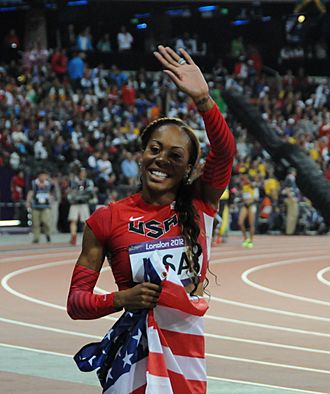
During the 2012 Olympics, Richards-Ross spoke out against a rule called Rule 40. This rule stopped athletes from mentioning their personal sponsors during the Games. This made it hard for many athletes to make a living, as they rely on money from sponsors.
Richards-Ross and other athletes started a social media campaign with the hashtag #WeDemandChange. They argued that it was unfair for athletes to compete for free while the Olympics made billions of dollars. Their efforts helped lead to changes in the rule for future Olympic Games.
Final Years and Retirement
After 2012, Richards-Ross had several surgeries for injuries. She competed in the 2015 World Championships and helped the U.S. relay team win a silver medal.
In 2016, she announced that it would be her last season. During the U.S. Olympic trials, she injured her hamstring and had to stop the race. The crowd at Hayward Field gave her a standing ovation as she said goodbye to the sport.
Personal Life
While at the University of Texas, Sanya began dating football player Aaron Ross. He later played in the NFL and won two Super Bowls. They married in 2010. The couple has two sons.
For several years, Richards-Ross dealt with a health issue that caused skin problems and joint pain. She often wore a compression sleeve on her arm during races, which became part of her signature look.
In 2013, she had her own reality TV show called Glam and Gold. The show followed her life as she trained, ran her businesses, and spent time with her family.
Achievements
Competition record
| Year | Competition | Venue | Position | Event | Result |
|---|---|---|---|---|---|
| Representing the |
|||||
| 2002 | World Junior Championships | Kingston, Jamaica | 3rd | 200 m | 23.09 (wind: -0.2 m/s) |
| 2nd | 400 m | 51.49 | |||
| 3rd (h) | 4 × 400 m relay | 3:35.84 | |||
| 2003 | World Championships | Paris, France | 11th (sf) | 400 m | 51.32 |
| 1st | 4 × 400 m relay | 3:22.63 | |||
| 2004 | Olympic Games | Athens, Greece | 6th | 400 m | 50.19 |
| 1st | 4 × 400 m relay | 3:19.01 | |||
| 2005 | World Championships | Helsinki, Finland | 2nd | 400 m | 49.74 |
| World Athletics Final | Monaco | 1st | 400 m | 49.52 | |
| 2006 | World Indoor Championships | Moscow, Russia | 9th (sf) | 400 m | 52.46 |
| World Athletics Final | Stuttgart, Germany | 2nd | 200 m | 22.17 | |
| 1st | 400 m | 49.25 | |||
| World Cup | Athens, Greece | 1st | 400 m | 48.70 | |
| 1st | 200 m | 22.23 | |||
| 2007 | World Championships | Osaka, Japan | 5th | 200 m | 22.70 |
| 1st | 4 × 400 m relay | 3:18.55 | |||
| 2008 | Olympic Games | Beijing, China | 3rd | 400 m | 49.93 |
| 1st | 4 × 400 m relay | 3:18.54 | |||
| 2009 | World Championships | Berlin, Germany | 1st | 400 m | 49.00 |
| 1st | 4 × 400 m relay | 3:17.83 | |||
| 2011 | World Championships | Daegu, South Korea | 7th | 400 m | 51.32 |
| 1st | 4 × 400 m relay | 3:18.09 | |||
| 2012 | World Indoor Championships | Istanbul, Turkey | 1st | 400 m | 50.79 |
| 2nd | 4 × 400 m relay | 3:28.79 | |||
| Olympic Games | London, United Kingdom | 5th | 200 m | 22.39 | |
| 1st | 400 m | 49.55 | |||
| 1st | 4 × 400 m relay | 3:16.88 | |||
| 2014 | World Relay Championships | Nassau, Bahamas | 1st | 4 × 400 m relay | 3:21.73 |
| 2015 | World Relay Championships | Nassau, Bahamas | 1st | Distance medley relay | 10:36.50 (WR) |
| 1st | 4 × 400 m relay | 3:19.39 | |||
| World Championships | Beijing, China | 2nd | 4 × 400 m relay | 3:19.44 | |
National titles
- Six-time national 400 meters champion – 2003 (51.01), 2005 (49.28), 2006 (49.27), 2008 (49.89), 2009 (50.05), 2012 (49.28)
Personal bests
| Event | Time (seconds) | Venue | Date |
|---|---|---|---|
| 60 meters | 7.21 | Lincoln, Nebraska, United States | February 28, 2004 |
| 100 meters | 10.97* | Shanghai, China | September 28, 2007 |
| 200 meters | 22.09 | New York City, USA | June 8, 2012 |
| 400 meters | 48.70 AR | Athens, Greece | September 16, 2006 |
- All information from World Athletics profile.
Diamond League wins
- 2011 – London (400 m)
- 2012 – Eugene (400 m), New York (200 m), Stockholm (400 m), Zurich (400 m)
Awards
- World Athletics Awards
-
- World Athlete of the Year (Women):2006, 2009
See also
 In Spanish: Sanya Richards-Ross para niños
In Spanish: Sanya Richards-Ross para niños
 | Victor J. Glover |
 | Yvonne Cagle |
 | Jeanette Epps |
 | Bernard A. Harris Jr. |


